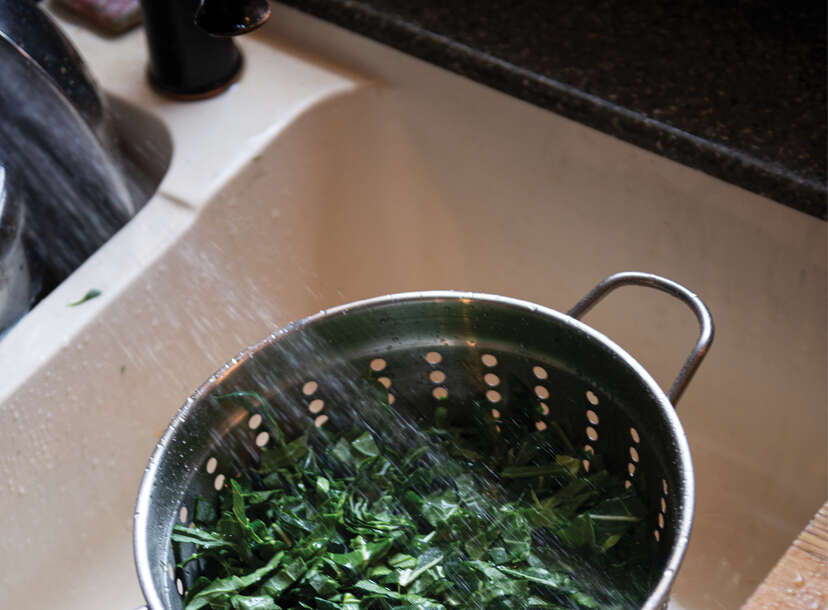These Greens Are Full of Umami and Lessons from the Land
Chef and farmer Matthew Raiford celebrates Gullah Geechee culture through his cuisine.

When Matthew Raiford steps onto his 50 acres of farmland in Brunswick, Georgia, he can practically feel his lineage in the soil. After all, Gilliard Farms was where he was raised and has been in his family since it was established in 1874, when his great-great-great-grandfather, Jupiter Gilliard, purchased the land for $9.05.
Today, the farm is owned and operated by Raiford, his sister Althea, and his wife Tia, who all help raise kunekune hogs and chickens, grow countless crops including hibiscus and purple potatoes, and are about to cultivate two acres of rice and start a charcuterie and butchery program.
“We’re getting back to those old ways on the farm,” Raiford says. “A lot of it comes from having written the book, which pushed us to dig deeper into regenerative agriculture and brought our organic farming to the next level.”
The book Raiford refers to is Bress ‘n’ Nyam, whose title means “bless and eat” in the Gullah language. Though often solely associated with South Carolina, Gullah Geeche culture and cuisine is actually far more expansive, Raiford says, and he made it the mission of his cookbook and its recipes to show people that versatility.
“I’ve always wanted to write a book about the Georgia coast and its foodways,” he says. “So many people believe that African-American food is a monolith. And many people think that Gullah Geechee is just one thing. This culture runs from North Carolina down to Florida and it’s part of many things. The more people study it, the more they will understand.”
Though he had been dreaming about and working on the book for years, Raiford says that 2021 felt like a very meaningful time for Bress ‘n’ Nyam to be released into the world.
“Of course it is past time, but it’s also the right time for people to have these recipes resonate with them,” he says. “People feel ready and willing. It happened to come out when people were doing 23 and Me, interested in learning about themselves, actually having conversations about their elders. People were talking about The Great Migration and the reverse, which is what my dad did.”
Not only did Raiford want his book, which he co-wrote with Amy Paige Condon, to provide a sense of place, but also a sense of the plates he grew up eating. His father was a talented baker, and they truly lived off the land and from the sea, feasting on everything from oysters to wild boar. But he also made a point to dedicate an entire chapter to vegetarian dishes, which were a household staple.
“It’s interesting to hear people go, ‘Man, you probably don’t have any vegetarian recipes in there’ when that’s the whole first chapter,” he says. “A lot of people think Black people put pork in everything. But we’re looking for the smokiness, not necessarily the meat. I started thinking about how I could accomplish the same flavors without the meat.”
One of his best examples is the Mess o’ Greens, which uses smoked paprika, apple cider vinegar, caramelized garlic and onions, and Montreal steak seasoning to imbue that rich, umami flavor into a bowl of greens. Besides the array of seasoning, his best tip is to think outside of the collards box.
“Embrace other greens,” he says. “I’ve met so many people who are like, ‘How do you make them so good?’ It’s really all those different greens. Add some mustard greens to kale with some collard and turnips and you have a multiplicity of levels of flavors. Play with your greens and enjoy the fact that the universe has given us all this.”
And perhaps the best part of the greens? What you’re left with when they’re done. Raiford’s family would drink the nutrient-rich juices, or potlikker, sopping it up with cornbread or saving it to make boiled peanuts or hearty stock. In many households, that stuff is as good as gold.
“We would never throw the juice away,” he says. “Gullah Geechee culture was about using everything until it can’t be used no more. Even when you look at George Washington Carver and his thought process of rotating crops to keep using the same soil because ‘God ain’t making no more land.’ That’s my favorite saying. That is really what it’s all about.”
Mess o’ Greens
Serves 4-6
Ingredients:
• 2 tablespoons olive oil
• 2 medium yellow onions, peeled and finely diced
• 3 garlic cloves
• 2 red, yellow, or orange bell peppers, stemmed, deseeded, and cubed
• 2 pounds each collard greens, mustard greens, and kale, shredded
• 4 quarts water
• 1 cup apple cider vinegar
• 2 tablespoons Smokin’ Hot ’n’ Sweet Seasoning (see below)
• 1 tablespoon pink Himalayan salt
Directions:
1. In a large stockpot, heat the olive oil over medium-high heat.
2. Add the onion and sauté until translucent, about 5-7 minutes. Add the garlic and caramelize, about 5-7 minutes more. Then add the peppers, stirring until they grow tender.
3. Add 1 pound of the greens, 2 quarts of the water, ½ cup of the vinegar, and 1 tablespoon of the seasoning.
4. Cook down for 15-20 minutes, then add the remaining greens and the remaining water and vinegar. The liquids will also make a strong stock, full of nutrients pulled from those greens.
5. Just before they are done, stir in the remaining tablespoon of seasoning and the salt. Serve immediately. Reserve the potlikker (nutrient-rich juices).
You may also like
Smokin’ Hot ’n’ Sweet Seasoning
Makes ½ cup
Ingredients:
• ¼ cup smoked paprika
• ¼ cup steak seasoning
• 1 teaspoon cayenne pepper
Directions:
1. Mix the ingredients
2. Store in an airtight container in a cool, dry place for up to 6 weeks.